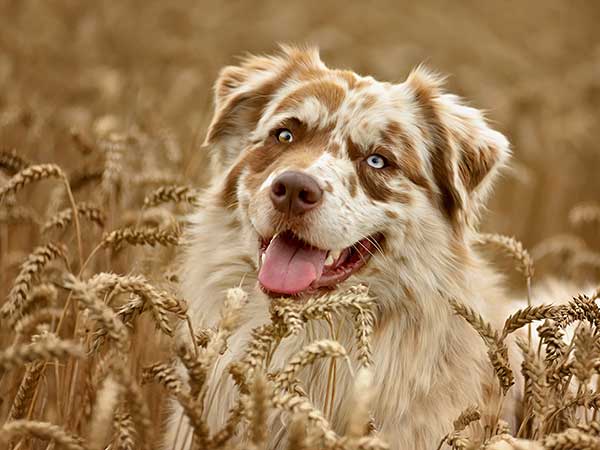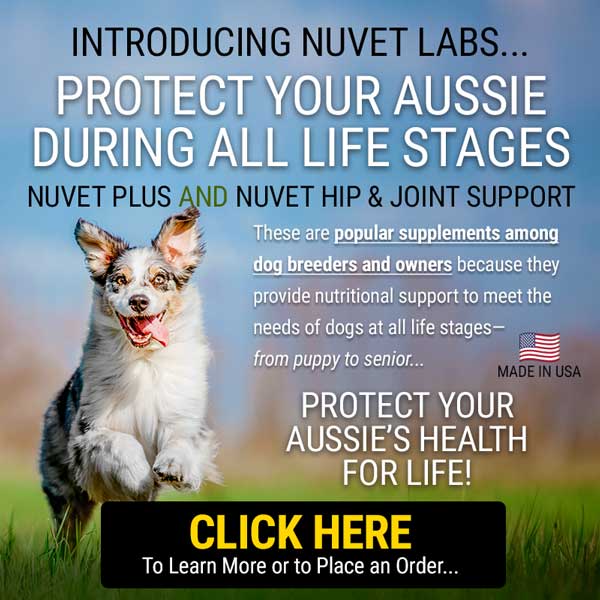
Why Choose All Natural Dog Food for Your Australian Shepherd?
A ll natural dog food sounds like a great idea, but finding a food that actually merits this description can be a daunting task. That's because the regulations for labeling in the pet food industry are drastically different than those used for human food. Which means that consumers can't always just trust what the label is telling them, no matter how good it may seem, because it is all too easy for dog food manufacturers to deceive you.
Dilated Cardiomyopathy (DCM) Notice
DCM is a heart condition that has been reportedly linked to certain low carbohydrate dog foods. However, the FDA has still not confirmed a specific cause and its latest study is also inconclusive. As such, at the time of this writing (July 16, 2020) there have still not been any recalls. For further information see: FDA, Dog Food Advisor article, and an article by Daniel Schulof, the founder and CEO of KetoNatural Pet Foods, Inc. addressing potential Bad Science and Financial Conflicts of Interest Plaguing the FDA's Investigation Into "Grain-Free" Pet Foods and Dilated Cardiomyopathy.
So where does that leave concerned dog owners and is it even really necessary to choose natural food for your Aussie? The simple answer is yes. Obviously, avoiding chemicals, preservatives, and fillers can only be a good thing as these additives provide no real nutritional benefit whatsoever. However, avoiding them entirely may be more challenging than you think.
With a greater emphasis on proper nutrition and health, there has been an influx of new dog food brands on the market in recent years offering what they claim are healthier alternatives that closely mimic the kind of diet your dog's ancestors would eat in the wild. That's a great idea on the surface, as your pet still has the same basic genetic makeup as his wild ancestors, so his nutritional needs are very much the same. That being said, not every all natural dog food actually backs up its claims.

Radek Havlicek / stock.adobe.com
While wheat and corn may be "all natural", they are often added to dog food as fillers and in excessive amounts can be unhealthy sources of carbohydrates.
The difficulty comes in when you consider the standards for labeling in the dog food industry. The governing body, the Association of American Feed Control Officials (AAFCO), has very broad suggested guidelines for labeling, indicating that for a food to be considered "natural" it must contain only ingredients derived solely from plant, animal or mined sources with no chemical or synthetic additives. However, as these are merely guidelines and not regulations, it is easy for pet food manufacturers to get around them.
In order to be sure of what you are feeding your dog, you need to pay careful attention to the ingredient list of any product you consider. Any truly all natural dog food will contain organically sourced proteins such as chicken, lamb, turkey and venison, along with fresh vegetables and fruits, preferably locally grown. Many of these companies will also bolster their foods with added nutrients such as vitamins, minerals, Omega 3 fatty acids, and antioxidants to maximize nutritional benefits.
All Natural Dog Food Isn't Always Healthy Dog Food
Another important quality in these foods is minimizing the carbohydrate content, as most carbohydrates offer little health benefits and can actually be detrimental to your dog's health. This can be particularly true for high energy breeds like the Australian Shepherd that need a good natural source of energy in order to maintain stamina and improve brain function—but it holds true across the board for any breed.
While some dog food brands use cheaper fillers like corn, others use alternative carbohydrate sources like rice, sweet potato, and peas. Of course, in the real world, most of us have to strike a balance between the absolute best ingredients and affordability.
If you're like most pet owners, you want what's best for your dog and that means choosing an all natural dog food to provide him with the nutrition he needs while avoiding any that may be harmful or even trigger a dog food allergy. In order to determine the best choice for your dog, or suspect he may have an allergy, you should consult your vet who can point you in the right direction. The rest is up to you. Do your homework, read those labels carefully and you'll be well on your way to choosing a food that gives your dog the best that nature has to offer.
Have Dog Training Questions?
Check out these introductory dog training videos...
I want my dog to stop being aggressive.
I want some help training my new puppy.
I want my dog to stop barking at everything.
Get Australian Shepherd Info, Website Updates, Special Offers, and Cartoons...
FREE GIFT
You'll also receive a free copy of the ebook
My Everyday Dog Training Tools
by professional dog trainer Daniel Abdelnoor, "Doggy Dan"











 Loading Image...
Loading Image...